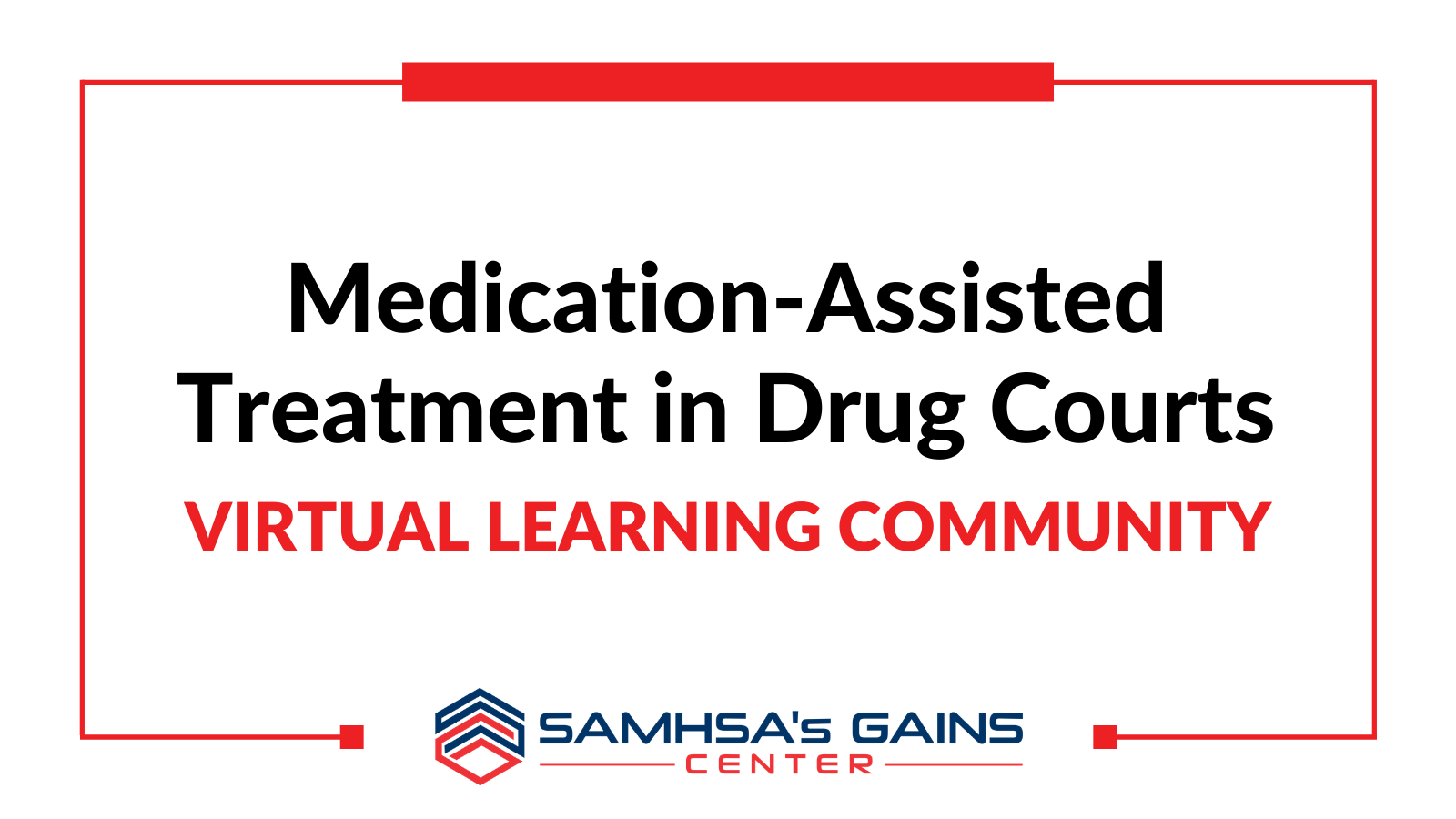Access recordings of SAMHSA’s GAINS Center’s three-part Virtual Learning Community focusing on the role of medication-assisted treatment (MAT) in drug courts. Hear experts speak about a variety of topics, including how to overcome resistance among court staff, supporting recovery in the community, and practical resources for facilitating MAT provision in the drug court context. Open-format discussion groups allowed webinar participants to take a deeper dive into the material and pose questions to the speakers. For information on future events, sign up for the GAINS Center mailing list.
Part 1: Addressing the Concerns of Court Staff about MAT
Click here for the Part 1 recording.
Despite the documented efficacy of medication-assisted treatment (MAT) and its designation as the “gold-standard” in the treatment of opioid use disorders, resistance among court officials and treatment providers has resulted in underutilization of this treatment option in some jurisdictions. This webinar identifies barriers to MAT acceptance by prosecution, defense, judges, case managers, treatment providers, and other members of the treatment court team and outlines several approaches for addressing these common concerns about MAT. A site-specific strategy for providing training to drug court staff are discussed.
Objectives:
After attending this webinar, attendees will be able to:
- Discuss the importance of MAT as a treatment response for persons with opioid use disorders.
- Understand common factors contributing to concerns around MAT among court officials court staff and treatment providers.
- Identify site-specific strategies to overcome MAT-related concerns.
Presenters
- Andrew Brown, M.P.A., Program Coordinator, Ottawa County Recovery Court, Michigan
- Hon. William G. Meyer, Ret., Senior Judicial Fellow, National Drug Court Institute, Virginia
- Laurence M. Westreich, M.D., Associate Professor of Clinical Psychiatry, Department of Psychiatry, New York University School of Medicine, New York
Part 2: Overcoming Barriers to Social Integration for Medication-Assisted Treatment (MAT) Participants
Click here for the Part 2 recording.
Personal recovery is promoted when individuals receiving medication-assisted treatment (MAT) have safe, stable, and drug-free housing; employment; and access to social support systems. Denial of services and supports to persons on MAT can pose challenging obstacles to recovery. This webinar documents barriers to social integration for persons on MAT and outlines strategies for overcoming these social barriers.
Objectives:
After attending this webinar, attendees will be able to:
- Understand common barriers experienced by persons on MAT related to obtaining housing, employment, and affiliation with social support groups.
- Identify strategies for working with housing providers, employers, and group facilitators to overcome these barriers.
- Identify site-specific implementation of these strategies.
Presenters:
- Ann Brekke, M.S., LCPC, CADC, Substance Use Treatment Program Director, Thresholds, Chicago, Illinois
- Adrienne Brown, M.S., Program Director, Employment Services, Thresholds, Chicago, Illinois
- Tim Devitt, Psy.D., CADC, Associate Vice President, Thresholds, Chicago, Illinois
- Abigail Kirkman, M.A., Assistant Director, SAMHSA SOAR Technical Assistance Center
- Eileen Niccolai, Vice President, Clinical Operations, Thresholds, Chicago, Illinois
- Anneliese Thurston, M.A., LCPC, Program Director, McHenry County Thresholds, Illinois
- Nadia Underhill, M.P.A., M.Sc., Vice President of Housing and Real Estate, Thresholds, Chicago, Illinois
- Jill Valbuena, M.S.W., LCSW, Program Director, Thresholds, Chicago, Illinois
- Anthony West, Program participant, Thresholds, Chicago, Illinois
Part 3: Introducing the National Association of Drug Court Professionals (NADCP) MOUD Toolkit
Click here for the Part 3 recording.
In coordination with the National Association of Drug Court Professionals (NADCP), this webinar introduces the Medication for Opioid Use Disorder (MOUD) Toolkit, which was developed with funding from the Office of National Drug Control Policy (ONDCP) and was released by NADCP in 2021. The Toolkit presents practical tools and resources for treatment court teams and will assist teams in their efforts to make critical connections with local jails and treatment providers. The emphasis of this webinar is on fostering partnerships and developing agreements to ensure access to community-based treatment services and supports for drug court participants.
Objectives:
After attending this webinar, attendees will be able to:
- Identify practical tools and resources for linking treatment court teams with community-based treatment providers.
- Apply information from the MOUD Toolkit to efforts being implemented across the nation.
Presenters:
- Hon. Craig D. Hannah, Supervising Judge for City Courts, Eighth Judicial District; Chief Judge, Buffalo City Court; Founder, Opioid Intervention Court, Buffalo, New York
- Sophia Lombardo, CRS, Re-entry Resource Liaison, Community Action Partnership, Lancaster, Pennsylvania
- Douglas B. Marlowe, Ph.D., J.D., Senior Scientific Consultant, National Association of Drug Court Professionals, Alexandria, Virginia
Join the GAINS Center mailing list for information on future event announcements and registration.


